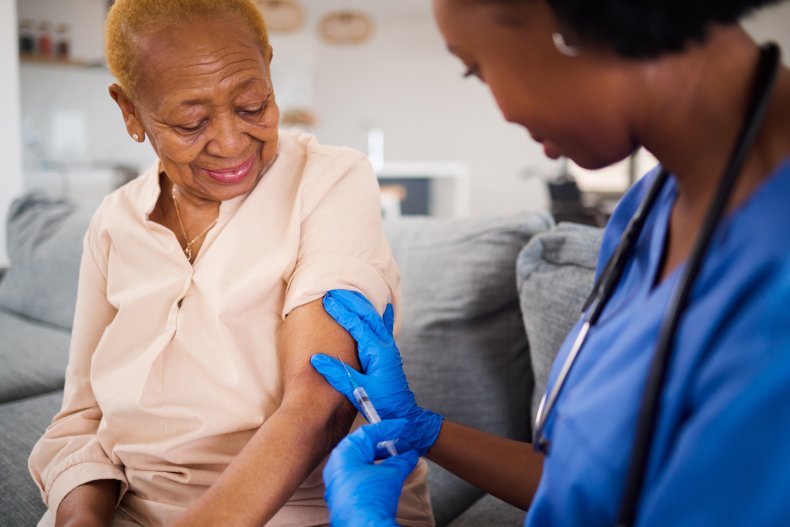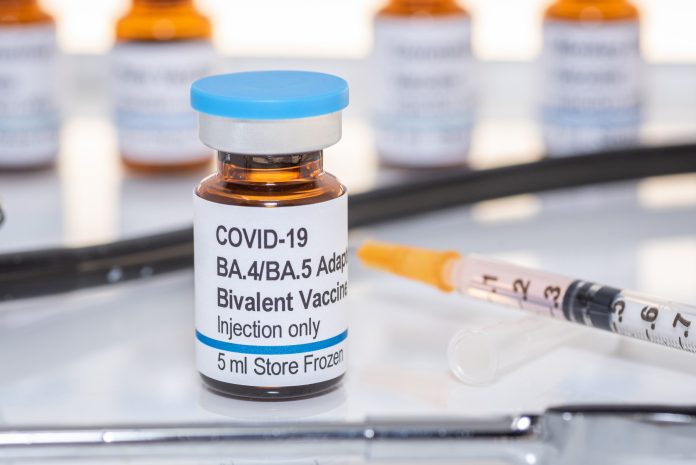An up to date spherical of COVID-19 booster vaccines was accredited by the U.S. Meals and Drug Administration (FDA) on Monday, with doses turning into accessible as early as the tip of this week.
The announcement comes amid a latest surge in COVID instances and hospitalizations. Prior to now two months, weekly COVID-19 hospitalizations have greater than doubled, in accordance with the U.S. Facilities for Illness Management and Prevention (CDC).
Nonetheless, the FDA’s announcement has led many to query the need of those booster vaccines, with others elevating considerations about their security. So what do the scientists say? Newsweek spoke to a few vaccine consultants to seek out out.
Manjurul/Getty
What Are Booster Vaccines?
Vaccinations work by imitating an an infection. The primary vaccination acts to prime the immune system towards distinctive spike proteins on the virus’s floor.
In response to those proteins, our physique produces an armory of antibodies which might be designed to destroy SARS-CoV-2 (or regardless of the goal an infection is for that specific vaccine). Nonetheless, these antibodies naturally lower over time. Boosters act as a manner of reminding our our bodies what that preliminary spike protein appeared like with a purpose to kick-start our immune response and construct again our antibody arsenal.
Over time, viruses are capable of change their spike proteins in order that the unique antibodies are much less properly tailored to acknowledge them. Subsequently, boosters may be up to date over time to raised deal with essentially the most dominant virus strains on the time and adapt to the virus’s ever-changing disguise.
What Are the Issues About New COVID Boosters?
Regardless of the overwhelming security profile of earlier COVID-19 vaccinations, some individuals are nonetheless involved concerning the security of those further vaccinations.
“The large security challenge is, in fact, myocarditis [heart inflammation],” William Schaffner, a professor of preventive medication and infectious illness on the Vanderbilt College Medical Heart, instructed Newsweek. “However myocarditis is first a uncommon occasion. Quantity two, it’s overwhelmingly very delicate, and the individuals who expertise it [usually] get well.
“This can be a very, very low danger contemplating the a lot greater danger of myocarditis after COVID itself, which regularly is forgotten. If you are going to get COVID, you are at a a lot larger danger of getting myocarditis than after the vaccine,” he mentioned.
Because the vaccines had been first put into circulation in December 2020, scientists have been capable of observe and replace the unwanted effects related to them. “The fact is that we have now had these vaccines for nearly three years,” Ziyad Al-Aly, a senior scientific epidemiologist at Washington College in St. Louis, instructed Newsweek. “Lots of of thousands and thousands of individuals around the globe have acquired them. They’re protected, and their effectiveness exceeded expectations.”
He continued: “Unwanted side effects are actual they usually occur, however at an exceedingly low frequency. Most if not all instances myocarditis after COVID-19 vaccine are self-resolving. The crucial query individuals ought to take into consideration is profit versus danger. We all know vaccines cut back the chance of extreme sickness, hospitalization and demise, and the dangers are exceedingly low.”

Prostock-Studio/Getty
Nonetheless, some have raised particular considerations about the newest booster replace.
“There’s been no scientific trial completed in human beings exhibiting that it advantages individuals,” Florida Surgeon Common Joseph Ladapo said in a news conference. “There’s been no scientific trial exhibiting that it’s a protected product for individuals.”
Nonetheless, the important thing level right here is that the up to date booster is just not a wholly new vaccine—it’s a minor tweak to the already current ones. “We all know precisely what the security profile of those vaccines is,” Schaffner mentioned. “They’re now not new vaccines, they usually have been scrutinized for security, way more than lots of the different vaccines which might be at present accessible.”
That is additionally not the primary time we have now up to date vaccines on this manner.
“We’ve got precedents for doing this,” Schaffner mentioned. “Have a look at influenza. The influenza vaccine is one thing that we use in thousands and thousands upon thousands and thousands of doses around the globe on an annual foundation. And we replace that vaccine utilizing the identical course of annually. And people up to date vaccines aren’t examined in individuals, however their manufacture is beneath the very intense scrutiny of the FDA. We’re doing the identical factor with RNA vaccines.”
Paul Offit, a pediatrician at Youngsters’s Hospital of Philadelphia who sits on the FDA’s vaccine advisory group, described Ladapo’s reasoning as a “straw man argument.”
“It is actually no totally different to the influenza vaccine…. It is all introduced on to scare individuals concerning the security of this vaccine,” he instructed Newsweek. “When you’ve greater than 13 billion doses of this vaccine given all through the world, I feel we all know precisely what its security profile is. It’s extremely protected.”
Who Ought to Get a COVID Booster?
Whereas most docs and scientists agree that the vaccine is protected, the principle debate in the present day is over who ought to be receiving these booster doses.
“There are two colleges of thought,” Schaffner mentioned. “There’s one college of thought that paints with a really broad brush. They are saying, Let’s make this vaccine a routine suggestion for the broadest inhabitants that we are able to. In different phrases, let’s stay in line with what the present suggestions are, specifically that everybody 6 months of age or older is eligible for this vaccine.
“The opposite viewpoint you’ll hear is extra focused, risk-based suggestions, specializing in individuals at greater danger,” he mentioned. “The place individuals are at greater danger, make [the booster] routine for them, after which say that anyone else who needs to obtain the vaccine can request to obtain it.”

Jacob Wackerhausen/Getty
Offit mentioned that this second strategy had been taken efficiently by a number of European nations, such because the U.Ok. and Germany. “The aim of this vaccine is to stop critical sickness,” he mentioned. “So the query now could be: Who’s getting hospitalized and who’s dying from this virus?
“It actually falls into a number of high-risk teams: people who find themselves aged; individuals with a number of well being issues like weight problems, power lung illness, coronary heart illness, kidney illness, liver illness; individuals who have diabetes; people who find themselves immunocompromised; and pregnant individuals,” he mentioned.
These individuals would even be included in a broad spectrum suggestion, however Offit mentioned that this may not be as efficient. “I feel whenever you say everyone advantages you dilute the message,” he mentioned. “Would not it make sense, if we needed to attempt to get these high-risk teams immunized, to actually focus messaging on these high-risk teams?
The second challenge with broad-spectrum booster suggestions is the fee. “Who pays for it?” Offit requested. “The federal government does have a little bit over $1.1 billion program the place, if you happen to’re uninsured or underinsured and you might be advisable to obtain the vaccine, you will get it. However there’s another excuse why it makes extra sense to focus on high-risk teams. In order that we are able to get these individuals vaccinated who’re probably to profit.”
Nonetheless, not everybody who has been hospitalized with COVID-19 would fall into this high-risk class. And but, such individuals clearly are vulnerable to extreme illness. “In case you are younger and powerful and wouldn’t have an underlying sickness, your danger of great illness is admittedly very low,” Schaffner mentioned. “However it isn’t zero.”
Al-Aly agreed, saying: “For my part, individuals older than 12 years previous ought to contemplate a booster.”
What’s extra, even delicate instances of COVID can lead to long-term signs after the preliminary an infection has cleared. “The proponents of common vaccination will level out that not solely do you cut back the chance of extreme illness by way of the vaccine however you additionally cut back the chance of lengthy COVID,” Schaffner mentioned.
The CDC was anticipated to announce who ought to be getting these up to date vaccinations on Tuesday afternoon.
Regardless of the last consensus, vaccine consultants agree that if you happen to fall into any of those high-risk teams, a booster shot is a protected and efficient strategy to cut back your danger of extreme COVID-19.
Is there a well being drawback that is worrying you? Do you’ve a query about COVID-19? Tell us by way of well [email protected]. We are able to ask consultants for recommendation, and your story could possibly be featured in Newsweek.


